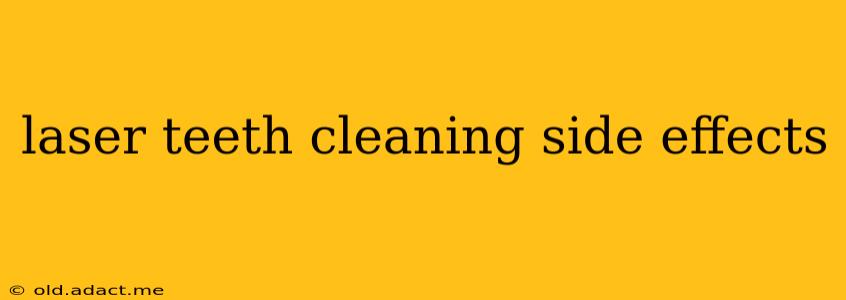Laser teeth cleaning, also known as laser scaling and root planing, is a modern dental procedure gaining popularity for its potential benefits. While generally considered safe and effective, like any dental procedure, it carries the potential for side effects. Understanding these potential side effects can help you make an informed decision and manage any discomfort after your treatment.
What is Laser Teeth Cleaning?
Before delving into potential side effects, let's briefly review what laser teeth cleaning entails. This procedure uses a laser to remove plaque and tartar buildup from teeth and beneath the gum line. It's often used to treat periodontal disease (gum disease) and can be less invasive than traditional scaling and root planing. The laser's precision minimizes damage to healthy gum tissue.
Common Side Effects of Laser Teeth Cleaning
While many patients experience minimal discomfort, some common side effects of laser teeth cleaning include:
-
Temporary Sensitivity: Increased sensitivity to hot and cold temperatures is a common temporary side effect. This is usually mild and resolves within a few days to a couple of weeks. Your dentist can recommend desensitizing toothpaste to help alleviate this.
-
Slight Bleeding: Some minor bleeding from the gums is possible, especially during or immediately after the procedure. This is usually minimal and stops quickly.
-
Temporary Swelling: Mild swelling of the gums may occur, especially in cases of more extensive treatment. This usually subsides within a few days.
-
Discomfort: You might experience some mild discomfort or soreness after the procedure. Over-the-counter pain relievers, such as ibuprofen, can usually manage this discomfort.
Less Common Side Effects of Laser Teeth Cleaning
While less frequent, more serious side effects are possible, though rare:
-
Burns: While rare with skilled dentists using appropriate techniques, burns to the gums or other soft tissues are a potential risk.
-
Infection: As with any procedure involving the gums, there is a small risk of infection. Maintaining good oral hygiene after the procedure is crucial to minimize this risk.
-
Nerve Damage: Damage to nerves is extremely rare but a potential complication.
Are there any long-term side effects?
Long-term side effects from laser teeth cleaning are exceedingly rare. Most side effects are temporary and resolve within a few days or weeks. If you experience prolonged or worsening symptoms, it's crucial to contact your dentist immediately.
How can I minimize side effects?
Following your dentist's post-operative instructions is crucial to minimize side effects. This typically includes:
- Maintaining good oral hygiene: Brush and floss gently, avoiding the treated areas until they heal.
- Using a prescribed mouthwash: Your dentist may prescribe an antiseptic mouthwash to help prevent infection.
- Avoiding irritating foods and drinks: Steer clear of hot, cold, acidic, or sugary foods and drinks until sensitivity subsides.
- Taking pain relievers as directed: Over-the-counter pain relievers can help manage any discomfort.
Is laser teeth cleaning better than traditional scaling and root planing?
Both laser and traditional methods are effective in treating periodontal disease. The choice depends on individual needs and preferences. Laser treatment may offer advantages such as reduced bleeding and discomfort for some patients.
How much does laser teeth cleaning cost?
The cost of laser teeth cleaning varies depending on factors such as the extent of treatment needed and your location. It’s best to consult with your dentist to get a personalized cost estimate.
What are the alternatives to laser teeth cleaning?
Traditional scaling and root planing are the main alternative to laser treatment. This involves using hand-held instruments to remove plaque and tartar.
This information is for general knowledge and does not constitute medical advice. Always consult with your dentist to determine the best treatment option for your individual needs and to discuss any concerns regarding potential side effects. They can assess your specific situation and provide personalized guidance.
